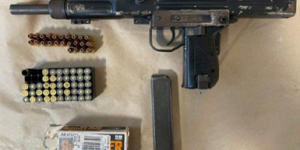Press Release
Convicted Felon Sentenced to More than Eight Years in Prison for Fentanyl Distribution Offenses and Possessing a Loaded Firearm with Obliterated Serial Number
For Immediate Release
U.S. Attorney's Office, District of Massachusetts
BOSTON – A Somerville man was sentenced on May 17, 2023 for distributing fentanyl and subsequently possessing fentanyl with intent to distribute while being illegally in possession of a loaded firearm.
Tevon Ngomba, 30, was sentenced by U.S. District Court Judge Indira Talwani to 97 months in prison and four years of supervised release. In November 2022, Ngomba pleaded guilty to one count of distributing and possessing with intent to distribute 40 grams or more of fentanyl, one count of possessing with intent to distribute fentanyl and one count of possessing a firearm and ammunition as a convicted felon.
On July 16, 2020, less than two months following his release from state prison, Ngomba distributed more than 40 grams of fentanyl to an individual in exchange for $1,800 in a recorded drug transaction.
On Aug. 3, 2020, Ngomba purported to sell a loaded firearm to the same individual in exchange for $1,500 in another recorded transaction. During the deal, which occurred in the individual’s vehicle, Ngomba loaded the firearm and pretended to leave it under the driver’s seat before exiting the vehicle. Instead, Ngomba took both the $1,500 cash from the individual as well as the firearm he had pretended to sell. Ngomba did not realize, however, that he accidentally left his cellphone in the individual’s vehicle which he preceded to chase down. Law enforcement immediately apprehended Ngomba who was still clutching the $1,500 in his hand.
During a subsequent search of Ngomba’s vehicle, a loaded Ruger firearm with an obliterated serial number was found in the trunk. Sixteen grams of fentanyl and a second cellphone containing drug-related communications were in the glove compartment. The cellphone Ngomba left in the individual’s car was found to contain images from the night before of Ngomba posing with what appeared to be the same firearm found in his vehicle. One image also showed Ngomba posing alongside two associates while he had a firearm in his pocket.
At the sentencing hearing, the Court also found that Ngomba obstructed justice during the litigation of the case, determining that Ngomba had submitted false documents to the Court in connection with a detention reconsideration hearing. Those documents included two letters purportedly written by two acquaintances of Ngomba (the same individuals depicted in one of the cellphone images) in which they denied any gang affiliation or association. A transcript of jail recordings captured Ngomba contacting an individual requesting that she draft letters in the names of those two associates. Ngomba detailed what to write in the letters and then instructed the female to create a fake email account from which to transmit the letters onto his attorney for submission to Court in support of his pretrial release. The letters ultimately were filed with the Court in connection with Ngomba’s detention reconsideration hearing.
Acting United States Attorney Joshua S. Levy; James M. Ferguson, Special Agent in Charge of the Bureau of Alcohol, Tobacco, Firearms & Explosives, New England Field Division; Somerville Police Chief Charles Femino; and Somerville Housing Authority Chief of Police Daniel Meade made the announcement. Assistant U.S. Attorneys Kaitlin R. O’Donnell and Fred M. Wyshak, III of Levy’s Organized Crime and Gang Unit prosecuted the case.
This case is part of Project Safe Neighborhoods (PSN), a program bringing together all levels of law enforcement and the communities they serve to reduce violent crime and gun violence, and to make our neighborhoods safer for everyone. On May 26, 2021, the Department launched a violent crime reduction strategy strengthening PSN based on these core principles: fostering trust and legitimacy in our communities, supporting community-based organizations that help prevent violence from occurring in the first place, setting focused and strategic enforcement priorities, and measuring the results.
Updated May 23, 2023
Topics
Drug Trafficking
Firearms Offenses
Component

 U.S. Department
of Justice
U.S. Department
of Justice

